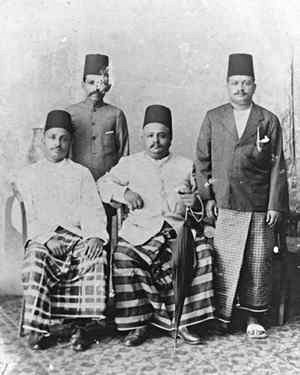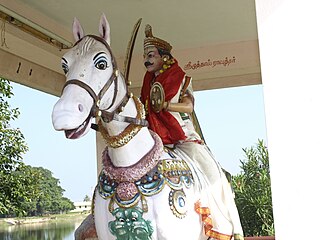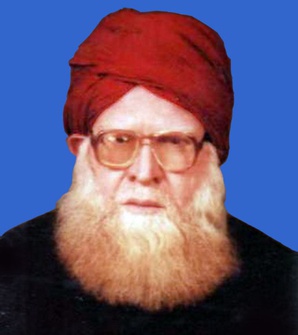Related Research Articles

The Barelvi movement, also known as Ahl al-Sunnah wa'l-Jamaah is a Sunni revivalist movement following the Hanafi and Shafi'i schools of jurisprudence, and Maturidi and Ashʿari schools of theology with strong Sufi influences and with hundreds of millions of followers. It is moderate form of Islam that Muslims in south Asia have followed for centuries and it encompasses a variety of Sufi orders, including the Chistis, Qadiris, Soharwardis and Naqshbandis as well as many other orders and sub-orders of Sufism. They consider themselves to be the continuation of Sunni Islamic orthodoxy before the rise of Salafism and Deobandi Movement.

Ahmed Raza Khan Barelvi, known reverentially as Ala Hazrat, was an Indian Islamic scholar, theologian, jurist, preacher, poet from Bareilly, British India, considered as the founder of the Barelvi movement and the Razvi branch of the Qadri Sufi order.
The Progressive Writers' Association or the Progressive Writers' Movement of India or Anjuman Tarraqi Pasand Mussanafin-e-Hind or Akhil Bhartiya Pragatishil Lekhak Sangh was a progressive literary movement in pre-partition British India. Some branches of this writers' group existed around the world besides in India, Kashmir and Pakistan

Sri Lankan Moors are an ethnic minority group in Sri Lanka, comprising 9.3% of the country's total population. Most of them are native speakers of the Tamil language. The majority of Moors who aren’t native to the North and East also speak Sinhalese as a second language. They are predominantly followers of Islam. The Sri Lankan Muslim community is mostly divided between Sri Lankan Moors, Indian Moors, Sri Lankan Malays and Sri Lankan Bohras. These groups are differentiated by lineage, language, history, culture and traditions.
Kathiawari Memons, a sub-group of the Memons, arrived in Ceylon from the Kathiawar region of Gujarat, India beginning in the 1870s.

The Rowther are originally a Tamil community from the Indian state of Tamil Nadu and Kerala. they were converted to Islam by the preacher Nathar Shah. Even after conversion they retained their caste name. they were elite cavalrymen of the Chola and Pandya kingdoms. They were traditionally a martial clan like the Maravars, and constitute large part of the multi-ethnic Tamil Muslim community. Rowthers have also been found as Tamil polygars, zamindars and chieftains from the 16th to 18th centuries. The traditional homelands of the Rowthers were in the interior of Southern Tamilakam.

Muhammad Ilyas Attar Qadri (Urdu: محمد الیاس قادری رضوی ضیائی Sindhi: محمد الياس قادري, known as Attar, is a Muslim scholar, a Sufi scholar of the Qadri Rizvi order and the founder of Dawat-e-Islami, a non-political global organization of Barelvi Sunnis spread over 195+ countries. He has some 30 million disciples all over the world.

Madrasa Manzar-e-Islam, also known as Jamia Razvia Manzar-e-Islam, is an Islamic seminary in India. It was founded in 1904 in Bareilly, India by Ahmed Raza Khan Barelvi.
Asiff Hussein is a Sri Lankan journalist and freelance writer. He is the author of a number of publications in the fields of ethnology, sociology, and linguistics. He currently serves as Editorial Director of Sailan Muslim, a Sri Lankan website, overseeing the Finance, Culture & Heritage and Publications pages.

Akhundzada Mohammad Abdul Ghafoor Hazarvi was a Muslim theologian, jurist, and scholar of ahadith in Pakistan. He was active in the Pakistan movement, member of Council of Islamic Ideology. He was the companion of Muhammad Ali Jinnah and separatist leader Maulana Zafar Ali Khan and was active in the independence movement of Pakistan against the British Raj. He was a Sufi of the Chishti Sufi order and the founding member of the religious Barelvi Sunni strain political party Jamiat Ulema-e-Pakistan (JUP). He became its president in 1948. He was also a political figure in Pakistan and was the first recipient of Nishan-e-Imtiaz by the President of Pakistan. He was also the chairman of Majlis-e-Tahaffuz-e-Khatme Nabuwwat, an organisation opposed to the Ahmadiyya Movement that waged a campaign against Mirza Ghulam Ahmed's claim of prophethood.

Muhammad Akhtar Raza Khan Azhari, also known as Tajush Shari'ah or Azhari Miya, was an Indian Barelvi Muslim scholar, cleric and mufti. He was the great grandson of Ahmed Raza Khan Barelvi who was considered to be a Mujaddid by his followers and was the founder of the Barelvi movement. He was recognised by Barelvi Muslims as the Grand Mufti of India. He was ranked 22nd on the list of The 500 Most Influential Muslims in the world, compiled by the Royal Islamic Strategic Studies Centre. He had tens of millions of followers in India.
Pir Syed Jamaat Ali Shah was a Pakistani Author, Islamic scholar and Sufi saint of the Naqshbandi Order. He Presided the All India Sunni Conference and leaded the Movement for Shaheed Ganj Mosque. He was a contemp of Ahmed Raza Khan Barelvi, the founder of Barelvi movement.

Jamiatur Raza is an Islamic seminary situated in Bareilly, India. It was established by Akhtar Raza Khan in 2000.

Muhammad Asjad Raza Khan Qadri is an Indian Islamic scholar who belongs to the Barelvi movement and a descendant of Ahmed Raza Khan Barelvi and son and successor of Akhtar Raza Khan, former Grand Mufti of India. He is considered as the Qazi-ul-Quzzat fil Hind or Qazi-e-Hindustan and Islamic Chief Justice of India. He is the Principal of Jamiatur Raza.

Naqi Ali Khan (1830-1880) was an Indian Sunni Hanafi Islamic Scholar, Mufti and father of Ahmed Raza Khan. Naqi Ali wrote 26 books on Seerah and Aqedah and he issued thousand Fatwas.
This Bibliography of Barelvi Movement is a selected list of generally available scholarly resources related to Barelvi movement, a revivalist movement within Sunni Islam, adhering to the Hanafi school of law, started in the late 19th by the Imam Ahmed Raza Khan Barelvi in British India.
Syed Abdullah Barelvi, also written Syed Abdullah Brelvi, was an Indian Freedom Fighter politician, Journalist and Editor of The Bombay Chronicle. He was the founder of the Congress Muslim Party on 8 July 1929 to fight for the rights of Muslim in India. He was the student of Imam Ahmed Raza Khan Barelvi. He started working at The Bombay Chronicle in 1924 to raise voice against the British Government.
Wasi Ahmad Surati also known as Muhaddis-e-Surati was an Indian Sufi saint and Islamic scholar. He belonged to the Barelvi movement of Sunni Islam.
Sunni Razvi Society often called Sunni Razvi Society International is an International Non-profitable organisation founded by Muhammad Ibrahim Siddiqui Khushtar in 1965 in Mauritius. It belongs to the Barelvi Movement of Sunni Islam and gains ideas from teaching of Ahmed Raza Khan Barelvi. The organisation spread to France, Holland, Kenya, Pakistan, Sri Lanka, Suriname and South Africa.
Hizbul Ahnaf also known as Dar-ul-Uloom Hizb-ul-Ahnaf or Madrasa-e-Hizbul Ahnaf is an Islamic Educational seminary founded by Syed Deedar Ali Shah Alwari, a student of Ahmed Raza Khan Barelvi and Khatib of Masjid Wazeer Khan in 1924 at Lahore. It is affiliated to the Barelvi movement of Sunni Islam. It was established under the Hizb ul Ahnaf-e-Hind, established in 1910s and inaugurated by Ahmed Raza Khan Barelvi.
References
- ↑ Hussein, Asiff; Bhoja, Hameed Karim (2006). Memons of Sri Lanka: Men, Memoirs, Milestones. Memon Association of Sri Lanka. p. 171. ISBN 978-955-1408-00-8.
- ↑ "Sri Lanka Memon Family Genealogy". www.worldgenweb.org. Retrieved 2023-12-26.
- ↑ Hussein, Asiff (2007). Sarandib: An Ethnological Study of the Muslims of Sri Lanka. Asiff Hussein. ISBN 978-955-97262-2-7.
- ↑ Fizayi, Khushtar (1999). Sri Lanka Mein Barelviyat (in Urdu). Maktaba Sunniyah. p. 36.
- ↑ Hussein, Asiff; Bhoja, Hameed Karim (2006). Memons of Sri Lanka: Men, Memoirs, Milestones. Memon Association of Sri Lanka. pp. 50–51. ISBN 978-955-1408-00-8.